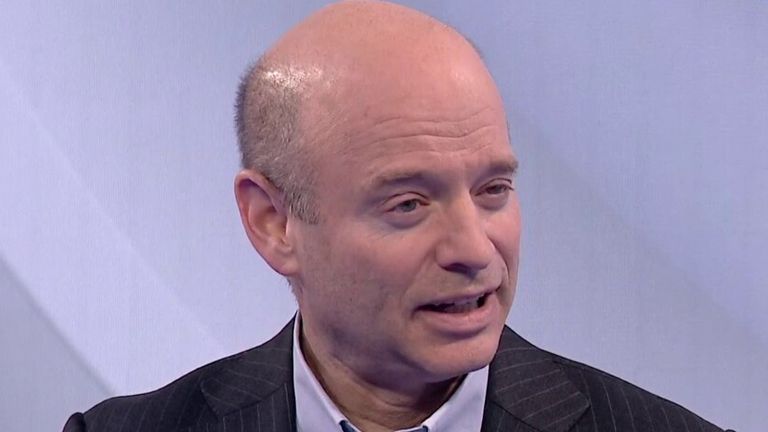The owner of the London Stock Exchange is plotting a multimillion pound pay rise for its chief executive amid a debate about whether FTSE 100 bosses’ incentive packages are damaging the competitiveness of Britain’s economy.
Sky News has learnt that London Stock Exchange Group (LSEG) is consulting with its major shareholders about a revised pay policy that would give boss David Schwimmer the opportunity to earn almost double his current maximum package of £6.25m.
Last year, Mr Schwimmer was paid just over £4.7m, of which £1m was his base salary, £1.4m his annual bonus and nearly £2m in the form of a long-term incentive award.
Money latest:
People who rent house out on Airbnb targeted by new law
Sources said that LSEG was now proposing to increase Mr Schwimmer’s base pay to around £1.25m, while his annual bonus opportunity would increase from 225% of salary to 300%.
In addition, his maximum annual LTIP award would increase from 300% of salary to 550%.
That would mean Mr Schwimmer, who has transformed the company since he took over in 2018, was eligible for a total package of around £11m.
One shareholder said they were backing the proposals ahead of LSEG’s annual general meeting in the spring because of concerns about the flow of UK-listed companies heading across the Atlantic to list on US stock markets.
The peer group of companies with which LSEG was competing was not other large FTSE-100 companies, they added, but American technology companies which were able to pay vastly higher remuneration packages.
Julia Hoggett, the LSEG chief executive who runs the London Stock Exchange subsidiary, sparked a debate last year when she warned that lower executive pay was hampering the ability of British companies to draw ‘global talent’ to their ranks.
Mr Schwimmer’s revised pay package has been communicated to nearly 100 investors during private discussions, with the response overwhelmingly positive, according to several sources.
In addition to his bigger pay deal, his minimum shareholding requirement will be increased from four times his salary to six times, according to one shareholder consulted on the plans.
The proposals are significant, partly because LSEG owns the London exchange and Ms Hoggett’s recent comments, but also because the body which represents institutional investors has also signalled a softening approach to large boardroom pay deals.
An LSEG spokeswoman said: “As stated in LSEG’s 2022 annual report, the remuneration committee will present a new policy to shareholders in 2024.
“The committee periodically reviews executive remuneration arrangements, in line with usual corporate governance practices, to ensure they remain fit for purpose and aligned to our ambitious growth strategy.
“The policy will focus on attracting, securing, retaining and rewarding the best talent in a competitive global market.”
Sky News revealed last month that the Investment Association, whose members collectively manage £8.8trn in assets, had drafted a letter to the chairs of FTSE-350 remuneration committees in which it highlighted a significant change in its stance towards bosses’ pay.
The IA said it acknowledged feedback from companies – particularly the largest in the FTSE-100 – that they were finding it increasingly challenging to “attract US executives and compete in the US market” because of the gulf between pay deals for bosses working for London and New York-listed businesses.
The draft also highlighted a growing desire from British companies to introduce so-called hybrid incentive schemes comprising both restricted stock and long-term share awards.
“These global companies are able to use such schemes in the US and other jurisdictions and feel such structures should be used for their executives,” the draft letter says.
The investor body flagged concerns raised by companies that the range of measures – such as malus, clawback and post-employment shareholding requirements – designed to prevent high pay packages being awarded without appropriate long-term evidence of strong financial performance may have gone too far.
“Individually, they are accepted as a means to increase the long-term alignment of executives and shareholders but in aggregate there may be a view that the perceived impact on the value of remuneration received is disproportionate,” it said.
The letter comes amid growing fears for the future of the London stock market following the release of data showing that the declining number of companies listed in the UK has accelerated in recent years, and amid visible signs that the City is losing ground to its biggest global rival.
Last month, Flutter Entertainment, the owner of Paddy Power and Betfair, confirmed that it intended to shift its primary listing to the US, while a growing number of companies have said they plan to float in New York rather than London.
In recent months, a number of prominent public company bosses, including the former chief executives of Barclays, BP and NatWest, have seen tens of millions of pounds of pay awards cancelled and clawed back owing to revelations of misconduct.
The latest intervention from the IA therefore marks a decisive shift from its stance in recent years, which has sought to hold boardroom pay chiefs to account over perceptions of excess in boardroom pay practices.
In 2017, the trade body introduced a public register to draw attention to any public company receiving significant opposition to boardroom pay packages in an attempt to put the brakes on inflated awards.
It also fought to curb windfall gains for executives after the Covid-19 pandemic triggered a plunge in many companies’ share prices, handing them bumper stock awards several years later.
Its revamped approach to executive pay nevertheless has the potential to prove controversial given ongoing concerns about the cost of living and the perspective of campaigners against multimillion pound corporate pay packages.

